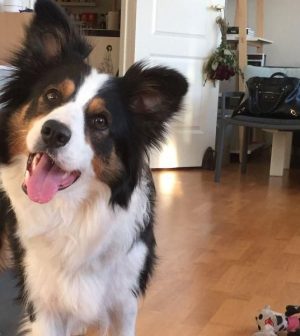- Recognizing the Signs of Hypothyroidism
- 10 Strategies to Overcome Insomnia
- Could Artificial Sweeteners Be Aging the Brain Faster?
- Techniques for Soothing Your Nervous System
- Does the Water in Your House Smell Funny? Here’s Why
- Can a Daily Dose of Apple Cider Vinegar Actually Aid Weight Loss?
- 6 Health Beverages That Can Actually Spike Your Blood Sugar
- Treatment Options for Social Anxiety Disorder
- Understanding the Connection Between Anxiety and Depression
- How Daily Prunes Can Influence Cholesterol and Inflammation
Very Smart Dogs Learn Words Quickly, Study Shows

Think your dog is smart? New research suggests one way to find out.
Most dogs can’t learn words without extensive training, but a few with exceptional abilities learn words without any formal training, researchers report. They learn words simply by playing with their owners.
The team of Hungarian researchers investigated how quickly two of these talented pooches could learn new words.
Their study included a Border Collie named Whisky from Norway — already famous for her spontaneous categorization skills — and a Yorkshire terrier named Vicky Nina, from Brazil.
“We wanted to know under which conditions the gifted dogs may learn novel words. To test this, we exposed Whisky and Vicky Nina to the new words in two different conditions — during an exclusion-based task and in a social, playful context with their owners,” said study first author Claudia Fugazza, a member of the Family Dog Project research team at Eötvös Loránd University, in Budapest.
“Importantly, in both conditions the dogs heard the name of the new toy only four times,” Fugazza said.
In the exclusion-based task, the dogs were presented with seven familiar dog toys, along with a new one. Their ability to choose the new toy after hearing its new name was tested. The dogs failed this test.
But the dogs quickly learned the name of a new toy after hearing it just four times when they played with their owners who pronounced the name of the toy while playing with the dog, according to the study published online Jan. 26 in the journal Scientific Reports.
“Such rapid learning seems to be similar to the way human children acquire their vocabulary around 2 to 3 years of age,” study co-author Ádám Miklósi said in a university news release.
Twenty other dogs were tested in the same way, but none learned the toy names. This shows that the ability to quickly learn new words is rare in dogs, according to the researchers.
However, they also found that Whisky’s and Vicky Nina’s memory of the new words faded fast. They no longer remembered them in follow-up tests conducted 10 minutes and one hour after first learning the new words.
More information
The researchers have launched an online Genius Dog Challenge.
SOURCE: Eötvös Loránd University, news release, Jan. 26, 2021
Source: HealthDay
Copyright © 2026 HealthDay. All rights reserved.










